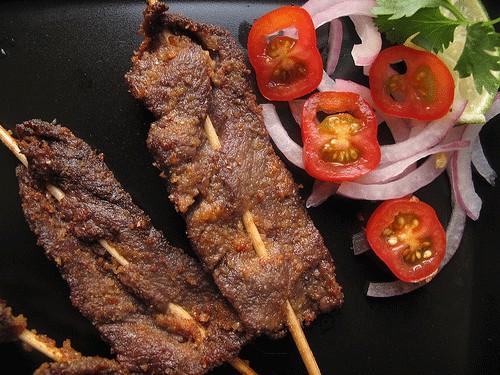To celebrate the 4th of July holiday, you might expect a family in America to feast on hot dogs smothered in ketchup, hamburgers dressed in cheese and grease, grilled chicken, perhaps a steak or two, and a side of chips. But don’t be surprised if you find African families in America feasting on plates of suya smothered in seasoning, moi moi dressed in new sheets of foil, egusi soup, perhaps a meat pie or two, and a side of chin chin.
Africans in America have the privilege of combining cultural counterparts that not everyone in this country has the awareness or ability to combine. We as Africans are able to incorporate traditional patterns into clothing, with an understanding of the roots and traditions from which these patterns originate, while at the same time learning how to appropriately apply them to modern American styles and dress.
We’re able to master English and articulate ourselves well when interacting with other Americans and at the same time hold steadfast to our native tongue. We can enjoy what one might consider to be "American cuisine" while at the same time keep a selective taste for our enticing African dishes. In the same manner that Africans who have migrated to American soil strive to never forget the land of their forefathers, Africans also must ensure that their tongues never forget the spices used by their mothers, grandmothers, aunts and neighbors back home.

We all have an agenda in life, our own written recipe for success. A set of instructions used to complete tasks or attain our desired lifestyle. As a result, our recipe for success during cultural celebrations could indeed be an actual recipe. We must remember all the ingredients necessary to bring out the zest in that jellof rice. We have to assess the right temperature at which to fry the plantains. These are all remnants of mental recipes that Africans keep in mind when cooking meals that contribute to the cultural celebration of our land.
Food is an essential aspect of life and particularly culture. It plays an important role in the distinctive lifestyles that various people from various places boast. When kept in mind that food is a vital part of culture it is necessary for African families in America to incorporate traditional meals in their daily diets. Not only will the food nourish their bodies but it’ll also nourish their respect and appreciation for their country, family and people to whom they can accredit their African heritage.
But one might ask: “As an African in America, why should there be so much emphasis on keeping African dishes in my household?” This leads me back to a claim made by the famous Marcus Garvey “A people without the knowledge of their past history, origin and culture is like a tree without roots.” It would be ludicrous to state that once you remove African dishes from African households that all respect for their culture is lost, but such an act would be a contributing factor to the gradual neglect of that household’s respect toward their origin.


To better understand the necessity of traditional dishes in the household, imagine African culture to be a puzzle displaying a beautiful picture of strength, courage, history, and hope. Think of each piece of the puzzle as various aspects of African culture. Perhaps one piece could be music, another piece food, and the other our attire, etc. By removing the puzzle piece that represents food and completely replacing it with any piece of another puzzle (like non African food) you would have constructed an entirely new image. If you allow for that puzzle to be removed piece by piece and replaced with the fragments of another illustration, a new image will emerge and dominate what the puzzle used to display. Removing traditional meals from the household will cause a detrimental domino effect that leads to the disregard for a lost culture.
Yam, fufu, ugba and akara could be viewed as simple dishes. But in the grand scheme of things, they contribute to the acknowledgement of the very culture that gives us life. They help us appreciate the land of our birth and the tradition that sustains us. No amount of French fries or apple pie can ever penetrate the boundaries within the souls and stomachs of Africans that hold a special place for traditional meals.
Indulging in these delicacies is more than mere tantalization for our taste buds. It's about embracing the culture that these dishes represent. Showing in simple ways that no matter the geographical location, African culture will always remain with African people. Using our mouths to not only preach about all that Africa has provided us, but also to intake the blessings that our land has given us.










